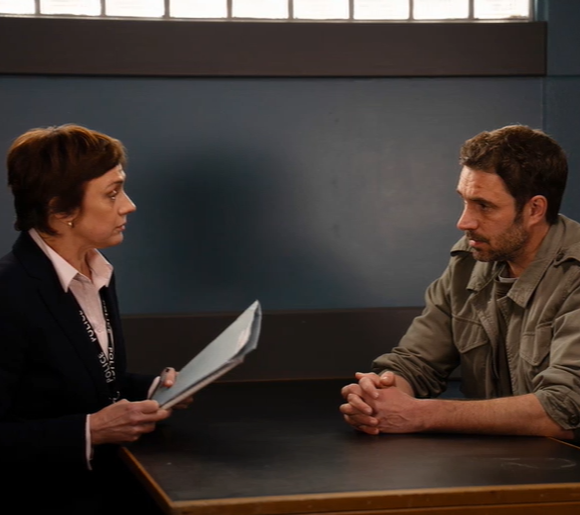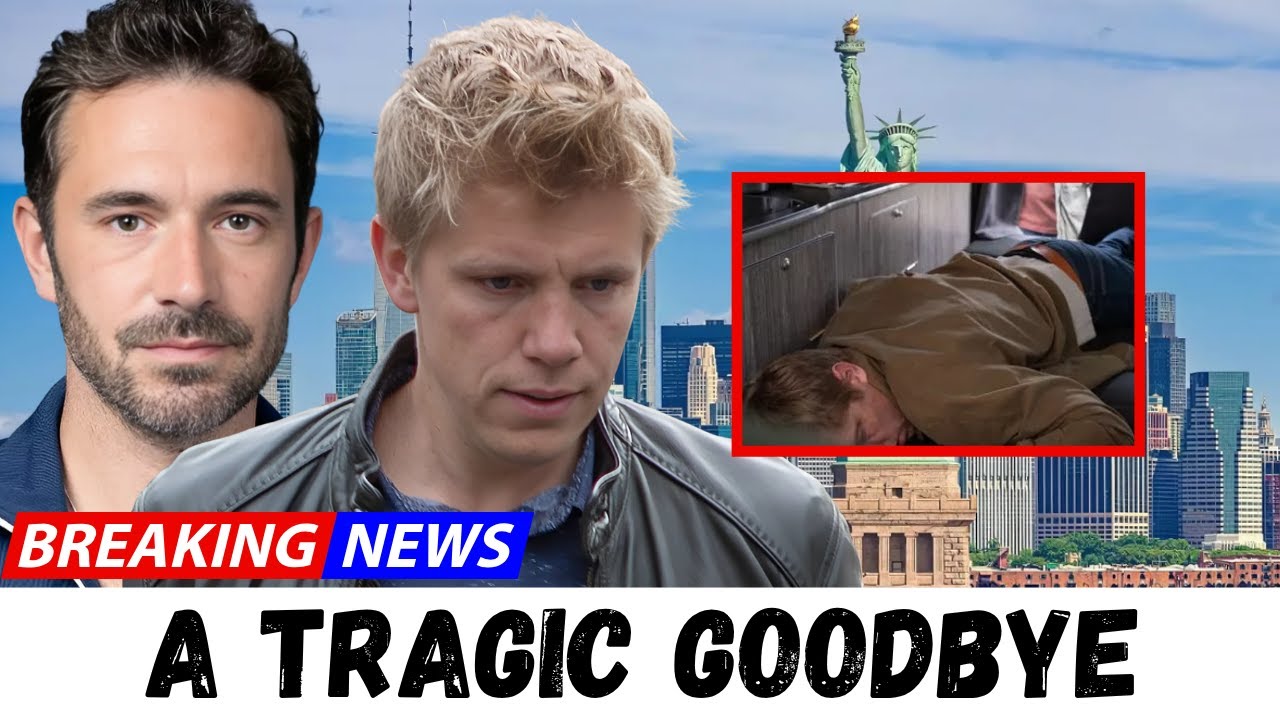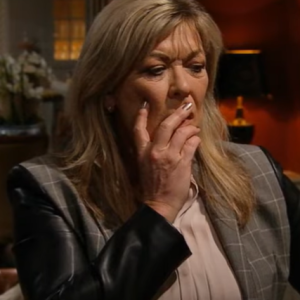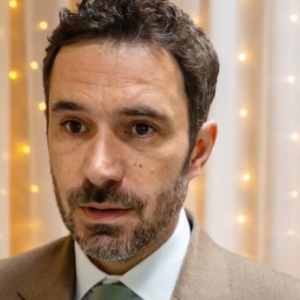The rolling hills of the Yorkshire Dales, long a symbol of rustic tranquility, have become the unsettling backdrop for a chilling drama of betrayal and deception. In a storyline that has gripped the nation, ITV’s beloved Emmerdale has pulled back the curtain on its most insidious villain yet, shattering the peace of the village and tearing apart the fabric of one of its most prominent families. At the heart of this unfolding tragedy lies a horrifying truth: the community’s trusted local hero, Dr. John Sugden, is a cold-blooded killer, and only his estranged half-brother, Robert Sugden, sees the monster lurking beneath the charming façade.
For months, Emmerdale viewers have watched with growing unease as a silent predator operated among them, his heinous crimes hidden behind a disarmingly benevolent smile. Dr. John Sugden, hailed by all as a pillar of the community and a selfless caregiver, has been systematically weaving a web of lies so intricate, so convincing, that the entire village was ensnared. His reign of terror began with the brutal murder of Nate Robinson, a life tragically and senselessly extinguished. But for John, Nate’s death was merely the first step in a calculated game of manipulation designed to cement his own twisted sense of security.
The aftermath of Nate’s murder was a masterclass in John’s psychological warfare. With the cold precision of a surgeon, he meticulously pointed the finger of blame at the innocent Tracy. Her world, already fragile, collapsed under the crushing weight of an accusation she couldn’t comprehend. John allowed her to twist in the wind, her reputation and sanity jeopardised, as he watched, detached and unburdened by conscience. Yet, even this wasn’t enough to satisfy his insatiable need for control and the absolute burial of his dark secrets. To truly silence any lingering doubts and secure his unassailable freedom, John committed an act of unspeakable cruelty that sent shivers down the spines of viewers nationwide.
During Monday’s heart-stopping episode, audiences witnessed John stoop to the ultimate low, orchestrating the framing of a dead man. With chilling composure, he planted a fake confession next to Owen Michael’s lifeless body, a final, ghoulish act of desecration designed to ensure a dead end for any potential investigation. This meticulous, horrifying move epitomized John’s profound depravity. With Owen Michael now posthumously blamed, John figuratively washed his hands clean, effortlessly slipped back into his friendly GP smile, and re-entered the community, once again their perceived guardian angel. His secrets, he believed, were buried with the innocent. But he hadn’t accounted for the one person whose instincts would scream louder than any fabricated evidence: Robert Sugden.
Robert Sugden’s return to the Dales was always destined to stir things up. His history with the village is as complicated as his relationship with his family, marked by periods of rebellion, fierce loyalty, and often, an unerring sense of justice. Yet, even his most fervent supporters could not have predicted the profound darkness his return would expose. While the rest of the village fawned over Dr. John, blind to the malevolence beneath his charming exterior, Robert felt a deep, gut-wrenching sense of unease. It was that primal instinct, that little voice in the back of his head, that tells you when something is profoundly wrong, even when you can’t quite explain why. His internal alarm bells clanged with increasing intensity, a stark contrast to the harmonious chorus of praise echoing throughout the Dales.

As the week progressed, Robert’s suspicion didn’t just grow; it festered like an untreated wound, poisoning his every thought. Everywhere he turned, he was met with another glowing testimonial for his half-brother: “Oh, John is just wonderful. He saved my life. He’s a pillar of this community.” Each word of praise, innocent in its intent, felt like a meticulously placed brick in a wall designed to hide something monstrous. Robert listened, his jaw tight, his keen eyes searching desperately for a crack in the carefully constructed façade. He voiced his doubts, articulating the very thoughts that viewers were screaming at their screens: “John is just too good to be true.”
Of course, nobody listened. Why would they? When faced with the agonizing choice of believing that your trusted local doctor is a kind, selfless soul or a manipulative, cold-blooded killer, the human mind naturally opts for the comforting option. Robert tried to talk to Chess, desperate for an ally, someone to validate his fears, but she brushed him off with a weariness born of long familiarity. To her, it wasn’t a genuine concern she heard, but the bitter ramblings of a jealous brother perpetually overshadowed by his sibling’s perceived success. Robert was left utterly alone, a solitary soldier on a battlefield where no one else even recognized the war. His isolation was palpable, heightening the tension and reinforcing the terrifying power of John’s deception.
Frustration slowly gave way to desperation. Robert knew he needed undeniable proof. An opportunity, fleeting and fraught with tension, presented itself in a heart-pounding moment: John left his phone unattended. It sat there, a sleek black box holding all the answers, the key to unlocking the truth and saving the village from the viper in its midst. Robert’s heart hammered against his ribs as he moved towards it, every fiber of his being screaming at him to seize the moment. This was it. The chance to expose his brother for what he truly was, to rip away the mask and reveal the monstrous face beneath. He reached for it, his fingers mere inches away from the screen, and then the moment was violently shattered. John returned.
The look that passed between them was electric, a silent communication charged with unspoken threat and dawning realization. It wasn’t anger on John’s face, not overtly, but something far more chilling: a faint, calculating concern. He saw Robert’s prying, and for a fleeting instant, the mask of the caring brother slipped just enough to reveal the cold, worried predator beneath. He knew his half-brother was a threat – perhaps the only one astute enough to see through his charade. From this precise moment, the game changed.
John, the master manipulator, immediately went on the offensive. With sinister cunning, he used Robert’s own family against him, twisting their genuine love and worry into a potent weapon. He voiced his fabricated concerns about Robert to Chess, painting a picture of a man consumed by irrational jealousy and paranoia. Even Victoria, who loved Robert dearly, became an unwitting pawn in John’s insidious game. She saw her brother spiraling, consumed by an obsession she couldn’t understand, and in her desperation, she begged him to get help. His refusal, driven by his conviction that he was right, only deepened her fear and reinforced John’s carefully constructed narrative of Robert’s supposed instability.

In her profound desperation, Victoria made a fateful, heartbreaking mistake. She turned to John, asking the wolf to check on the shepherd. She approached the very man Robert suspected, believing him to be the only one who could get through to her distraught brother. You could almost see the sinister plan forming behind John’s eyes, his calculating mind seizing the golden opportunity not just to discredit Robert, but to neutralize him completely. He agreed, of course, promising to “check in” on Robert, but his true plan was far darker, a chilling escalation in his campaign of terror.
Under the guise of a benevolent house call, John committed the ultimate betrayal. He sneaked into their home, the one place Robert should feel safe, and planted a sophisticated listening device. It was a terrifying violation of privacy, a clear and undeniable sign that John would stop at nothing to protect his secrets, even if it meant destroying his own flesh and blood. He was no longer just covering his tracks; he was actively hunting his own brother, transforming their family home into a psychological battleground.
And what he discovered turned the entire saga on its head. As he listened in, eavesdropping on the most private of moments, John learned that Robert was harboring a secret of his own. The hunter had just discovered a profound vulnerability in his prey, a hidden card that could shift the power dynamics entirely. The question that now hangs heavy in the air is explosive, reverberating through every corner of the Dales: What could Robert possibly be hiding? Is it something from his past, a dark deed that could be twisted to undermine his credibility? Is it connected to Nate’s death in a way we never imagined, perhaps an unwitting involvement that could inadvertently tie him to John’s crimes? Or is it a secret so powerful, so damaging, that John can use it as leverage to silence him forever, to break his spirit and ensure his own continued freedom?
The battle lines have been drawn not in the picturesque fields of Emmerdale, but within the fractured Sugden family itself. It’s brother against brother, primal instinct against masterful deception, the perceived saint against the undeniable sinner. One thing is certain: a storm of unprecedented magnitude is coming to the Dales, threatening to lay bare the deepest secrets and test the very foundations of trust in a community blindsided by evil. The stage is set for a confrontation that will irrevocably alter the landscape of Emmerdale forever.





